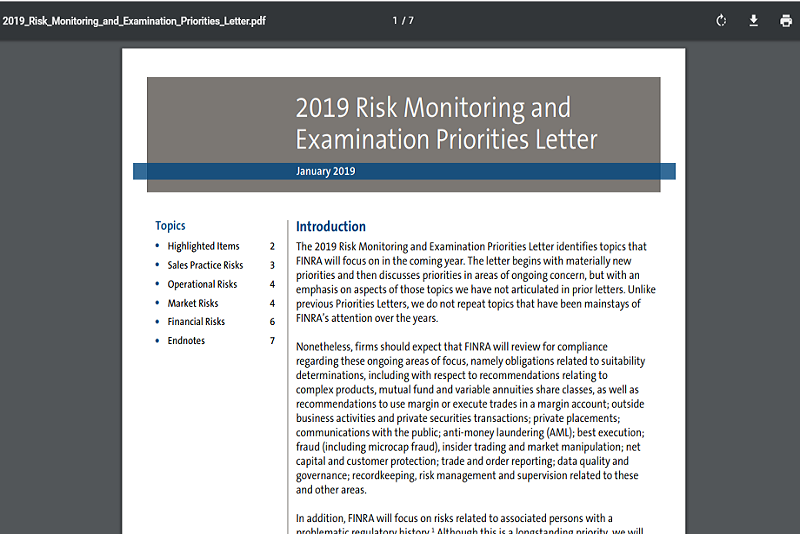BROWSE BY TOPIC
- Bad Brokers
- Compliance Concepts
- Investor Protection
- Investments - Unsuitable
- Investments - Strategies
- Investments - Private
- Features/Scandals
- Companies
- Technology/Internet
- Rules & Regulations
- Crimes
- Investments
- Bad Advisors
- Boiler Rooms
- Hirings/Transitions
- Terminations/Cost Cutting
- Regulators
- Wall Street News
- General News
- Donald Trump & Co.
- Lawsuits/Arbitrations
- Regulatory Sanctions
- Big Banks
- People
TRENDING TAGS
Stories of Interest
- Sarah ten Siethoff is New Associate Director of SEC Investment Management Rulemaking Office
- Catherine Keating Appointed CEO of BNY Mellon Wealth Management
- Credit Suisse to Pay $47Mn to Resolve DOJ Asia Probe
- SEC Chair Clayton Goes 'Hat in Hand' Before Congress on 2019 Budget Request
- SEC's Opening Remarks to the Elder Justice Coordinating Council
- Massachusetts Jury Convicts CA Attorney of Securities Fraud
- Deutsche Bank Says 3 Senior Investment Bankers to Leave Firm
- World’s Biggest Hedge Fund Reportedly ‘Bearish On Financial Assets’
- SEC Fines Constant Contact, Popular Email Marketer, for Overstating Subscriber Numbers
- SocGen Agrees to Pay $1.3 Billion to End Libya, Libor Probes
- Cryptocurrency Exchange Bitfinex Briefly Halts Trading After Cyber Attack
- SEC Names Valerie Szczepanik Senior Advisor for Digital Assets and Innovation
- SEC Modernizes Delivery of Fund Reports, Seeks Public Feedback on Improving Fund Disclosure
- NYSE Says SEC Plan to Limit Exchange Rebates Would Hurt Investors
- Deutsche Bank faces another challenge with Fed stress test
- Former JPMorgan Broker Files racial discrimination suit against company
- $3.3Mn Winning Bid for Lunch with Warren Buffett
- Julie Erhardt is SEC's New Acting Chief Risk Officer
- Chyhe Becker is SEC's New Acting Chief Economist, Acting Director of Economic and Risk Analysis Division
- Getting a Handle on Virtual Currencies - FINRA
ABOUT FINANCIALISH
We seek to provide information, insights and direction that may enable the Financial Community to effectively and efficiently operate in a regulatory risk-free environment by curating content from all over the web.
Stay Informed with the latest fanancialish news.
SUBSCRIBE FOR
NEWSLETTERS & ALERTS
FINRA 2019 Priorities Letter (Part Three) – Operational and Financial Risks
by Howard Haykin
-
Supervision of Digital Assets Business
-
Customer Due Diligence and Suspicious Activity Reviews
-
Credit Risk
-
Funding and Liquidity
OPERATIONAL RISK - SUPERVISION OF DIGITAL ASSETS BUSINESS. FINRA will not discourage firms from participating in activities related to digital assets – e.g., cryptocurrencies. It simply encourages those firms to notify FINRA if they plan to engage in such activities, even where a membership application is not required. In 2019, FINRA will review firms’ activities through its membership and examination processes related to digital assets and assess firms’ compliance with applicable securities laws and regulations and related supervisory, compliance and operational controls to mitigate the risks associated with such activities.
Coordinating closely with the SEC, FINRA will consider how firms determine whether a particular digital asset is a security and whether firms have implemented adequate controls and supervision over compliance with rules related to the marketing, sale, execution, control, clearance, recordkeeping and valuation of digital assets, as well as AML/Bank Secrecy Act rules and regulations.
OPERATIONAL RISK - CUSTOMER DUE DILIGENCE, SUSPICIOUS ACTIVITY REVIEWS. FINRA will assess firms’ compliance with FinCEN’s Customer Due Diligence (CDD) rule, which became effective in May 2018. The CDD rule requires that firms: (i) identify beneficial owners of legal entity customers; (ii) understand the nature and purpose of customer accounts; (iii) conduct ongoing monitoring of customer accounts to identify and report suspicious transactions; and, (iv) on a risk basis, update customer information. FINRA will focus on the data integrity of those suspicious activity monitoring systems, as well as the decisions associated with changes to those systems.
FINANCIAL RISK - CREDIT RISK. FINRA will review firms’ pols and procedures for identifying, measuring and managing credit risk, including risk exposures that may not be readily apparent. For example, a firm may be exposed to credit risk when it becomes responsible for transactions that its customers and correspondents execute “away” from the firm, without the firm’s participation until after execution.
Such responsibility can be incurred under clearing arrangements, prime brokerage arrangements, “give up” arrangements, sponsored access arrangements or principal letters. If sizable and conducted in a period of high volatility, trades under such arrangements may create large exposures for which the firm holds little or no collateral.
FINRA will also assess the extent to which firms identify and address all relevant risks when they extend credit to their customers and counterparties.
While a firm may believe that its margin requirements eliminate counterparty or customer credit risk, that firm can be exposed to sizeable losses in the event of a default by a customer whose margin account contains illiquid, volatile or concentrated securities positions. Similar risk exposures may exist when firms lend on products or strategies that have potential for large market moves, such as certain options strategies and structured products.
FINANCIAL RISK - FUNDING AND LIQUIDITY. FINRA will continue to evaluate firms’ liquidity planning, including whether they have a reasonable process to regularly assess the adequacy of their liquidity pools and update their stress test assumptions based on changes in their businesses, products and customers. This year, FINRA will focus on whether firms update their stress test assumptions in light of changes in the marketplace, such as the increased volatility experienced at various points in 2018.
FINRA will also assess the adequacy of firms’ liquidity pools and their review of the reasonableness of stress test assumptions on a regular basis in light of all of their business activities and arrangements, including any arrangements where firms become responsible for transactions that their customers and correspondents execute “away” from them.





